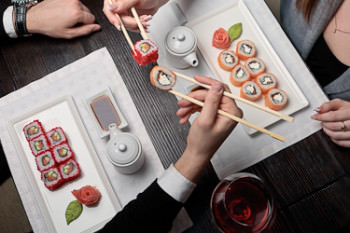 As mentioned previously, I am taking a class on Behavioral Economics. The key point is that humans are not rational decision makers. This is true in economic decisions and I believe it is also true in swinging situations and relationships in general. A major problem that I have in swinging is Choice Overload, i.e. what happens when people are overwhelmed with too many options. According to economic theory there are four typical outcomes that happen:
As mentioned previously, I am taking a class on Behavioral Economics. The key point is that humans are not rational decision makers. This is true in economic decisions and I believe it is also true in swinging situations and relationships in general. A major problem that I have in swinging is Choice Overload, i.e. what happens when people are overwhelmed with too many options. According to economic theory there are four typical outcomes that happen:
Defer/not participate. Obviously in the swinging context, if the goal is to get with people then this is not a particularly positive option. But this has happened to me on more than one occasion. Just last night I attended a Meet and Greet (thanks, TeamFun) at a vanilla bar with over 80 entities (couples count as one entity but there were a few singles). Too many people at an event make me want to be a wallflower. Even with the games that are supposed to facilitate interaction, I found myself just kind of walking around aimlessly and that is despite knowing several people. Just too many choices.
Unsurprisingly, despite some positive conversations with a few people and an invite to the local club, we ended up just going home. As in the past, my strategy has been to bail and then later contact a person to see if they want to get together later. Sometimes people ignore it. But realistically, if they ignore it then they are self weeding out which again helps with my choice overload problem.
Copy Others. Another option people use is to just choose what everyone else is picking, i.e. using other people’s choices as a heuristic. That is a fancy word that means an experience-based mental shortcut to find a solution that is acceptable but not necessarily optimal when finding the optimal solution is not practical. In addition to the problem of fakes, flakes, and cheaters, I think this is part of the reason people use validations as a screening technique.
Path of Least Resistance. One more thing people do when there are too many options is to choose the default (first option) or the status quo option. I know I do this. If you want to get with me at an event, be the first person I run into. I know that’s not sexy, but it’s true. Once I start talking to you, unless there is complete revulsion, I will tend to keep talking to you and that is likely to lead to playing at least once, also known as a “test fuck.”
Risk Taking. Finally, an interesting phenomena discussed was that when the number of choices is small people make riskier choice but if too many options they make more conservative choices. I try to keep it in mind when making choices in a large hotel/club setting versus a small house party or one off date. In the smaller setting, do I lower my standards and make riskier, stupid choices? Probably. Conversely, maybe I am passing up someone great in a big setting by just sticking to those I already know.
Professors wouldn’t be professors if they didn’t give a list of things to help out with an identified problem. So here is what is recommended to deal with choice overload with my interpretation of how this would work in swinging.
1) Organize and eliminate options. This was previously discussed in weeding out profiles. Basically make some rules and sort out the unacceptable.
2) Outsource choice to an expert. I’m not sure there are swinger matchmakers, but that could be an interesting business plan. On the other hand, I have used referrals from people that I already know. I mean if we like Wesley and Buttercup and they tell us we’d like Jack and Jill, then Jack and Jill might be great too, right?
3) Streamline choices. At a big event just do a first cut of people and then contact to meet later on a smaller group basis. Actually at last night’s Meet and Greet, despite going home we did go home with plans to meet a few people at later times.
4) Attribute Decision. This means looking at certain factors rather than the whole package. For example a Chinese menu might list 200 items but in the end they are just variations on meat, cooking style, sauce type, veggie type. Imagine if Subway had a name for every variation of sandwich, you’d be overwhelmed too. Since people have nearly unlimited attributes selecting on some of these can help: height, smoking, tattoos, age. Unfortunately, the things that would actually be useful if you are like me and care about personality aren’t typically listed right out there in profiles. Where are the drop down lists and check boxes for political leaning, sports teams, hobbies, and music preference (no country please!)?
5) Understand your preferences. A lot of people have no idea what they actually want or what makes them like something. Unless you are a true connoisseur, this just as true for wines as it is for sex partners. Otherwise profiles wouldn’t say ambiguous things like “looking for fun easy to get along with people.” Try to come up with key words to describe your ideal. I definitely need to do this. Of course, first I need to figure out what it is that I actually like in some kind of predictable fashion.
I feel like this writing should have some sort of conclusion. But I’m not sure what, so I’ll just wish everyone good luck and hope that some of my meandering thoughts on behavioral economics will be of use to you.


1 Comment
What an eminently practical article! I had never considered applying economic principals to swinging. I suppose it could make for some very interesting play parties regarding the virtues of supply side economics and the single male (that’s a joke).
Keep up the great work!